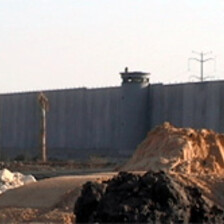National Post 20 August 2003
Since Israel began building a security fence to protect its citizens from terrorists based in the West Bank, Palestinians have labelled the project an “apartheid wall.” According to the Electronic Intifada, a popular Web site for pro-Palestinian activists, this is because the fence is “a colonial project that embodies within it the long-term policy of occupation, discrimination and expulsion.”
Of course, the accusation is nonsensical. If Israel really wanted to occupy the West Bank permanently, the last thing it would do is draw a steel and concrete line separating the territory from Israel’s pre-1967 land mass. (Indeed, this is why Jewish settlers in the West Bank — who comprise one of the most militant Jewish constituencies — oppose the idea of a fence.) As various commentators have noted, the charge of “apartheid” makes as much sense regarding Israel’s fence as it does regarding the wall protecting the United States from illegal Mexican immigrants.
The real reason Israel is building the fence is to prevent acts of terrorism — such as yesterday’s brutal suicide-bomb attack on a Jerusalem bus. Every nation in the world has the right — and, in fact, duty — to protect its citizens, and Israel is correctly asserting that right. Since the current intifada began, more than 800 Israelis have been killed in terrorist attacks and more than 5,600 injured. Though the number of attacks fell once the “road map” peace process began, they have not yet dropped to zero — thanks to the Palestinian Authority’s refusal or inability to confront terrorist groups. And as we have noted in this space before, there is no “acceptable” level of terrorism, and Israel should not be expected to act as if there was.
Almost all of the attacks have originated in the West Bank — none from Gaza, though its residents bristle equally at the Israeli presence. The reason is simple: Unlike the West Bank, Gaza is already separated from Israel proper by a fence. This fact provides grounds for optimism that the new fence, once complete, may cut terrorism dramatically.
This helps explain why Palestinian supporters condemn the fence. Many falsely believe that terrorism — or the threat thereof — will force Israel to make dramatic concessions to the Palestinians, and perhaps might even lead to the destruction of Israel entirely. And so they naturally oppose any security measure that will impede the violence. It is only because expressing support for terrorism openly would be outre that fence opponents instead give us cynical claims about “apartheid.”
All this said, Israel should proceed cautiously with the fence. Prime Minister Ariel Sharon says the barrier will not demarcate the line between Israel and a future Palestinian state. It is understandable that he would take this position, since he does not want to antagonize either the small number of Palestinians who live on the Israeli side of the fence nor the Jewish settlers who live deep within the West Bank. But we are skeptical: Once the fence is complete, it seems inevitable that both the Israeli government and the Palestinian Authority will come to treat it as a de-facto border. Certainly, with its watch-towers and security checkpoints, it will look and feel like one. Thus, Mr. Sharon may be creating a border Israelis have to live with for centuries. “Measure twice, cut once” should be his motto.
As far as is consistent with Israel’s security needs, Mr. Sharon must also ensure the security fence does not penetrate unduly into Palestinian areas in a manner that suggests a land grab. One planned portion of the fence, for instance, would dip about 25 kilometres into the West Bank to swallow the large Israeli settlement of Ariel. Then there is the Palestinian town of Qalqilya. Because it lies sandwiched between Israel proper and a network of Jewish settlements, the fence will effectively encircle Qalqilya’s residents on all sides. Politically, the point of the fence’s loops and detours is to protect as many Israeli settlers as possible. But they are also a gift to those who seek to characterize the whole project as an “apartheid wall.” Thankfully, Mr. Sharon has sensibly agreed not to complete these controversial segments until a compromise is reached with the U.S. government, which has expressed concern over the fence’s route.
Moreover, wherever the fence is ultimately located, Mr. Sharon must ensure that the Palestinians whose lands lie in its path are treated fairly — and, where necessary, compensated financially for their hardship. Israel has already done much in this regard — carefully replanting uprooted olive trees, replacing damaged subsurface piping and consulting with local leaders to ensure that water reservoirs are protected, for instance. Still, in many cases, farmers have found themselves cut off from crops or deprived of truck-borne water for irrigation. These people want nothing to do with terrorism, and are merely trying to feed their families under difficult circumstances. Notwithstanding such barbarous acts as yesterday’s bombing, Israel must demonstrate its moral superiority by doing all it can to treat ordinary Palestinians in a humane fashion.
Ultimately, the fence will not bring peace: That won’t come until Palestinians — and Arabs generally — accept the existence of a Jewish state in their midst. But the fence will at least reduce the human toll wrought by Palestinian extremism. In the meantime, it is not Israel’s security measures that should be the target of condemnation, but the terrorism that necessitates them.
Related Links


